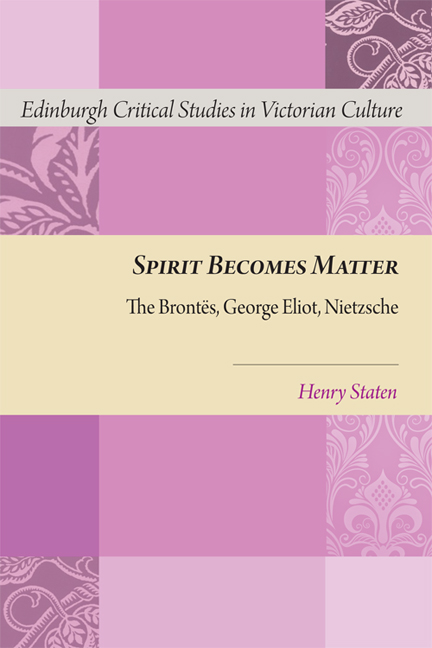Book contents
- Frontmatter
- Contents
- Series Editor's Preface
- Author's Preface
- Acknowledgements
- Dedication
- Introduction
- 1 The Poisoned Gift of Forgiveness (Jane Eyre)
- 2 Subincision of the Ethical Subject (Middlemarch)
- 3 What Things Cost in Middlemarch
- 4 The Return to the Heath (Wuthering Heights)
- 5 Spirit Becomes Matter
- Index
1 - The Poisoned Gift of Forgiveness (Jane Eyre)
Published online by Cambridge University Press: 05 August 2016
- Frontmatter
- Contents
- Series Editor's Preface
- Author's Preface
- Acknowledgements
- Dedication
- Introduction
- 1 The Poisoned Gift of Forgiveness (Jane Eyre)
- 2 Subincision of the Ethical Subject (Middlemarch)
- 3 What Things Cost in Middlemarch
- 4 The Return to the Heath (Wuthering Heights)
- 5 Spirit Becomes Matter
- Index
Summary
The crucial unresolved question of Jane Eyre criticism concerns the relation between its romantic plot, which tells the story of one woman's triumphant struggle against oppressive forces of religiously based convention, and its religious plot, the narrative of the ‘pilgrim's progress’ of that same woman back toward (some sort of) Christian faith. The central narrative drive of the novel, the one that has over the years impressed most readers, is clearly that of Jane's fight for personal freedom and autonomy, be it only that of ‘bourgeois individualism’; the subtler religious plot is woven into events that appear secondary from the standpoint of the romantic reading, and into a pervasive texture of allusions to biblical language that only a reader intimately familiar with this language can perceive. It is thus not surprising that so much Jane Eyre criticism simply ignores the religious plot. Nevertheless, a substantial, and growing, body of work supports the view that the religious plot is not only important in the novel, but dominant.
What we think is fundamentally at stake in this novel depends on how we answer the question of the relation between its two plots. If Jane's ultimate concern is to be defined in terms of orthodox Christianity, or of some wider, ‘spiritual’ standpoint, perhaps one that, as Jeffrey Franklin says, ‘includes’ and ‘supersedes’ Christianity, then Jane Eyre is a pious or inspirational work, not a strictly secular one, and does not participate, as probably the majority of readers over the past century have believed, in the intellectual adventure of the modern secular intellect.1
The very proliferation of religious readings of Jane Eyre has, however, muddied the view of what is at stake, because these readings have such varying notions of what counts as Christianity. Some, which invoke the classical statements of Christian doctrine by St Paul, Bunyan and others as a standard by which to measure Jane's faith, argue that, despite the dominance of the religious plot, Jane's religion falls short of orthodoxy.
- Type
- Chapter
- Information
- Spirit Becomes MatterThe Brontes, George Eliot, Nietzsche, pp. 31 - 75Publisher: Edinburgh University PressPrint publication year: 2014



